Analysis of Mental Health Workers in the UK: Policies and Regulations
VerifiedAdded on 2021/04/24
|8
|1863
|210
Essay
AI Summary
This essay provides an analysis of mental health workers in the UK, highlighting their crucial role in providing care and support to individuals with mental health disorders. It explores the responsibilities of these workers, including delivering therapies, providing practical assistance, and advocating for their patients. The essay delves into the historical context of mental health policies in the UK, examining the impact of the Mental Health Act of 1959, 1983, and 2007, as well as recent policies aimed at increasing access to services and reducing stigma. The discussion also addresses the successes and challenges faced by mental health workers, such as combating stigma and navigating the complexities of patient care. The conclusion emphasizes the need for societal changes to improve attitudes towards mental illness and underscores the importance of early intervention strategies and advocacy in promoting recovery.

Running head- HEALTH AND SOCIAL CARE
Analysis of Mental Health Workers in the UK
Name of the Student
Name of the University
Author Note
Analysis of Mental Health Workers in the UK
Name of the Student
Name of the University
Author Note
Paraphrase This Document
Need a fresh take? Get an instant paraphrase of this document with our AI Paraphraser
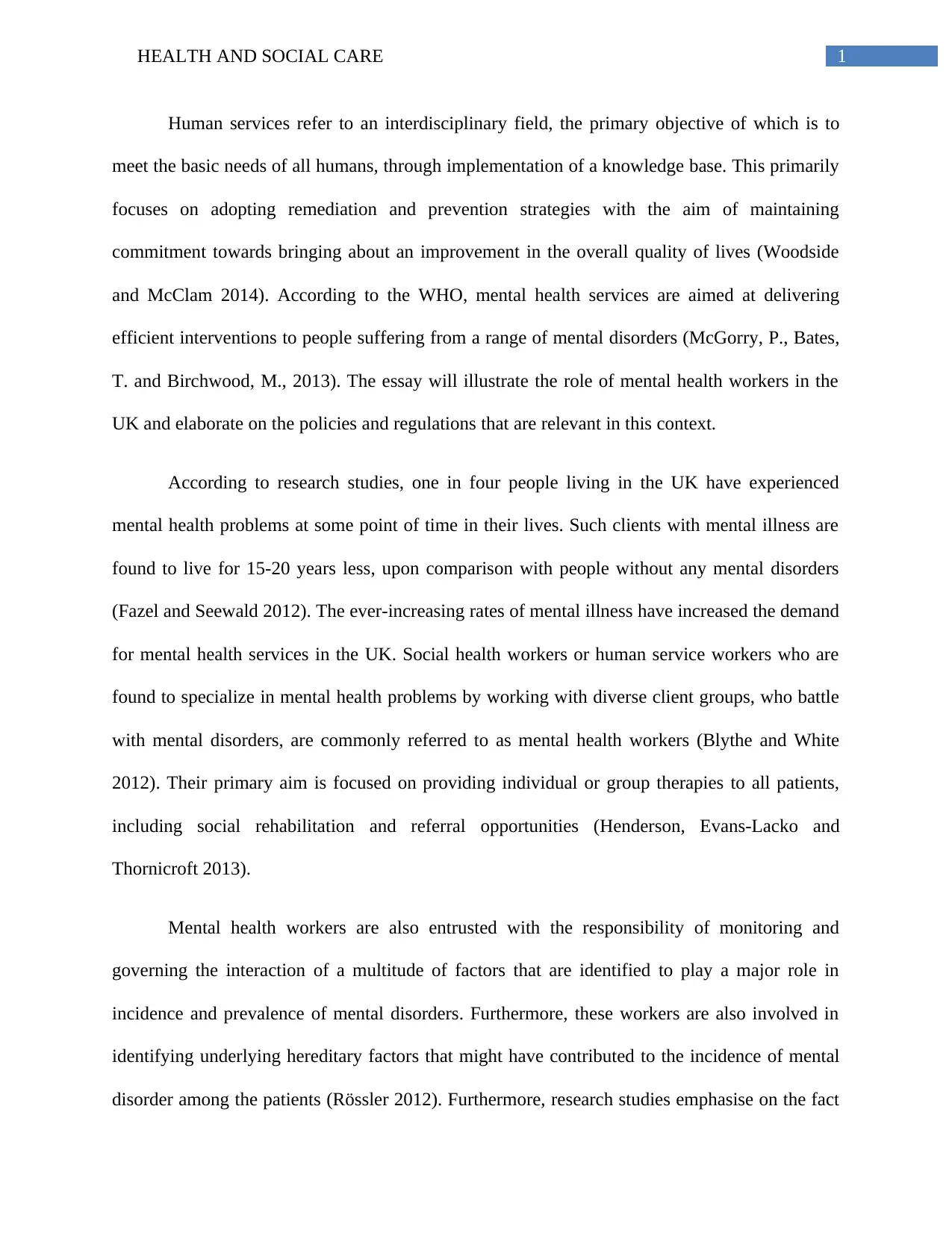
1HEALTH AND SOCIAL CARE
Human services refer to an interdisciplinary field, the primary objective of which is to
meet the basic needs of all humans, through implementation of a knowledge base. This primarily
focuses on adopting remediation and prevention strategies with the aim of maintaining
commitment towards bringing about an improvement in the overall quality of lives (Woodside
and McClam 2014). According to the WHO, mental health services are aimed at delivering
efficient interventions to people suffering from a range of mental disorders (McGorry, P., Bates,
T. and Birchwood, M., 2013). The essay will illustrate the role of mental health workers in the
UK and elaborate on the policies and regulations that are relevant in this context.
According to research studies, one in four people living in the UK have experienced
mental health problems at some point of time in their lives. Such clients with mental illness are
found to live for 15-20 years less, upon comparison with people without any mental disorders
(Fazel and Seewald 2012). The ever-increasing rates of mental illness have increased the demand
for mental health services in the UK. Social health workers or human service workers who are
found to specialize in mental health problems by working with diverse client groups, who battle
with mental disorders, are commonly referred to as mental health workers (Blythe and White
2012). Their primary aim is focused on providing individual or group therapies to all patients,
including social rehabilitation and referral opportunities (Henderson, Evans-Lacko and
Thornicroft 2013).
Mental health workers are also entrusted with the responsibility of monitoring and
governing the interaction of a multitude of factors that are identified to play a major role in
incidence and prevalence of mental disorders. Furthermore, these workers are also involved in
identifying underlying hereditary factors that might have contributed to the incidence of mental
disorder among the patients (Rössler 2012). Furthermore, research studies emphasise on the fact
Human services refer to an interdisciplinary field, the primary objective of which is to
meet the basic needs of all humans, through implementation of a knowledge base. This primarily
focuses on adopting remediation and prevention strategies with the aim of maintaining
commitment towards bringing about an improvement in the overall quality of lives (Woodside
and McClam 2014). According to the WHO, mental health services are aimed at delivering
efficient interventions to people suffering from a range of mental disorders (McGorry, P., Bates,
T. and Birchwood, M., 2013). The essay will illustrate the role of mental health workers in the
UK and elaborate on the policies and regulations that are relevant in this context.
According to research studies, one in four people living in the UK have experienced
mental health problems at some point of time in their lives. Such clients with mental illness are
found to live for 15-20 years less, upon comparison with people without any mental disorders
(Fazel and Seewald 2012). The ever-increasing rates of mental illness have increased the demand
for mental health services in the UK. Social health workers or human service workers who are
found to specialize in mental health problems by working with diverse client groups, who battle
with mental disorders, are commonly referred to as mental health workers (Blythe and White
2012). Their primary aim is focused on providing individual or group therapies to all patients,
including social rehabilitation and referral opportunities (Henderson, Evans-Lacko and
Thornicroft 2013).
Mental health workers are also entrusted with the responsibility of monitoring and
governing the interaction of a multitude of factors that are identified to play a major role in
incidence and prevalence of mental disorders. Furthermore, these workers are also involved in
identifying underlying hereditary factors that might have contributed to the incidence of mental
disorder among the patients (Rössler 2012). Furthermore, research studies emphasise on the fact
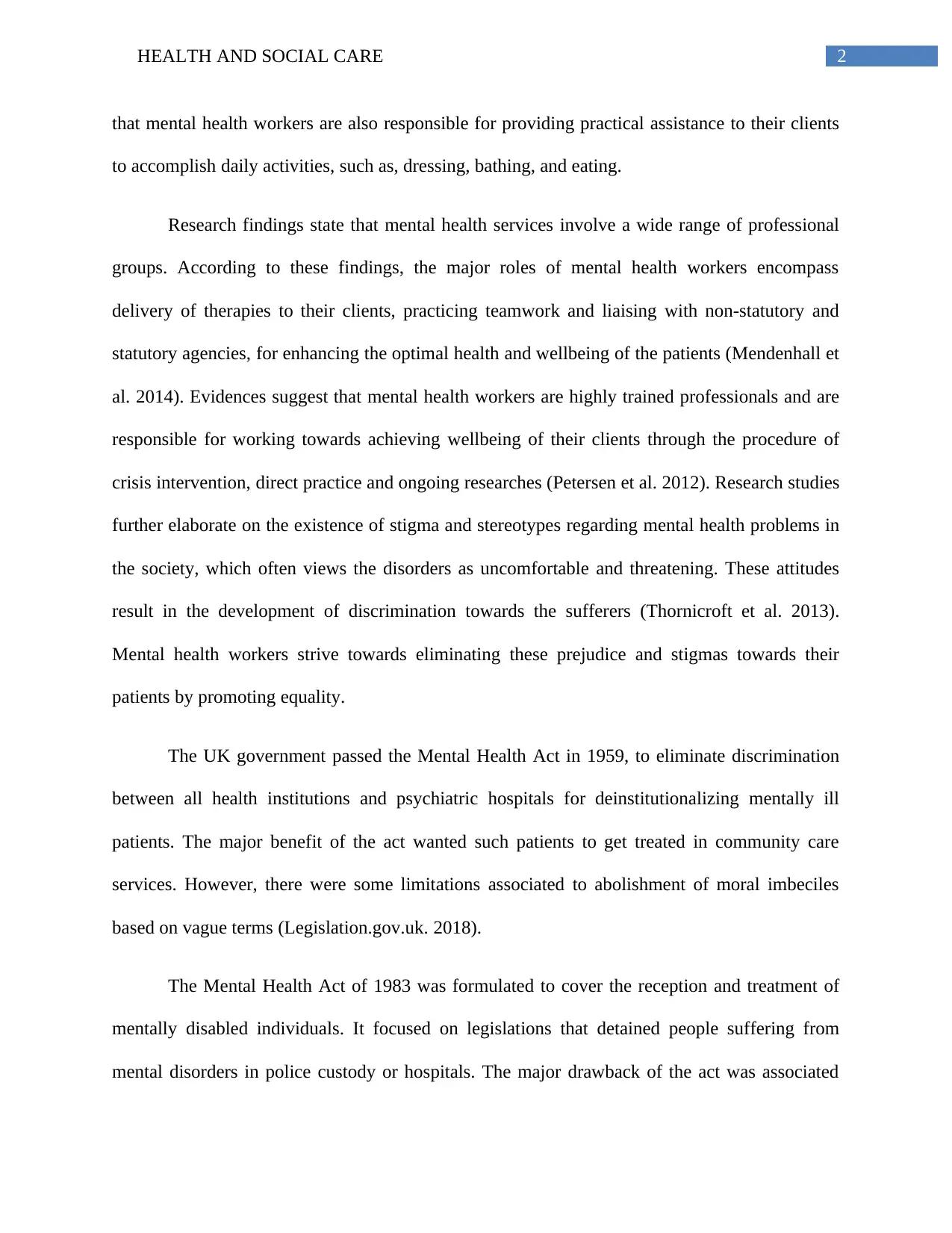
2HEALTH AND SOCIAL CARE
that mental health workers are also responsible for providing practical assistance to their clients
to accomplish daily activities, such as, dressing, bathing, and eating.
Research findings state that mental health services involve a wide range of professional
groups. According to these findings, the major roles of mental health workers encompass
delivery of therapies to their clients, practicing teamwork and liaising with non-statutory and
statutory agencies, for enhancing the optimal health and wellbeing of the patients (Mendenhall et
al. 2014). Evidences suggest that mental health workers are highly trained professionals and are
responsible for working towards achieving wellbeing of their clients through the procedure of
crisis intervention, direct practice and ongoing researches (Petersen et al. 2012). Research studies
further elaborate on the existence of stigma and stereotypes regarding mental health problems in
the society, which often views the disorders as uncomfortable and threatening. These attitudes
result in the development of discrimination towards the sufferers (Thornicroft et al. 2013).
Mental health workers strive towards eliminating these prejudice and stigmas towards their
patients by promoting equality.
The UK government passed the Mental Health Act in 1959, to eliminate discrimination
between all health institutions and psychiatric hospitals for deinstitutionalizing mentally ill
patients. The major benefit of the act wanted such patients to get treated in community care
services. However, there were some limitations associated to abolishment of moral imbeciles
based on vague terms (Legislation.gov.uk. 2018).
The Mental Health Act of 1983 was formulated to cover the reception and treatment of
mentally disabled individuals. It focused on legislations that detained people suffering from
mental disorders in police custody or hospitals. The major drawback of the act was associated
that mental health workers are also responsible for providing practical assistance to their clients
to accomplish daily activities, such as, dressing, bathing, and eating.
Research findings state that mental health services involve a wide range of professional
groups. According to these findings, the major roles of mental health workers encompass
delivery of therapies to their clients, practicing teamwork and liaising with non-statutory and
statutory agencies, for enhancing the optimal health and wellbeing of the patients (Mendenhall et
al. 2014). Evidences suggest that mental health workers are highly trained professionals and are
responsible for working towards achieving wellbeing of their clients through the procedure of
crisis intervention, direct practice and ongoing researches (Petersen et al. 2012). Research studies
further elaborate on the existence of stigma and stereotypes regarding mental health problems in
the society, which often views the disorders as uncomfortable and threatening. These attitudes
result in the development of discrimination towards the sufferers (Thornicroft et al. 2013).
Mental health workers strive towards eliminating these prejudice and stigmas towards their
patients by promoting equality.
The UK government passed the Mental Health Act in 1959, to eliminate discrimination
between all health institutions and psychiatric hospitals for deinstitutionalizing mentally ill
patients. The major benefit of the act wanted such patients to get treated in community care
services. However, there were some limitations associated to abolishment of moral imbeciles
based on vague terms (Legislation.gov.uk. 2018).
The Mental Health Act of 1983 was formulated to cover the reception and treatment of
mentally disabled individuals. It focused on legislations that detained people suffering from
mental disorders in police custody or hospitals. The major drawback of the act was associated
⊘ This is a preview!⊘
Do you want full access?
Subscribe today to unlock all pages.

Trusted by 1+ million students worldwide
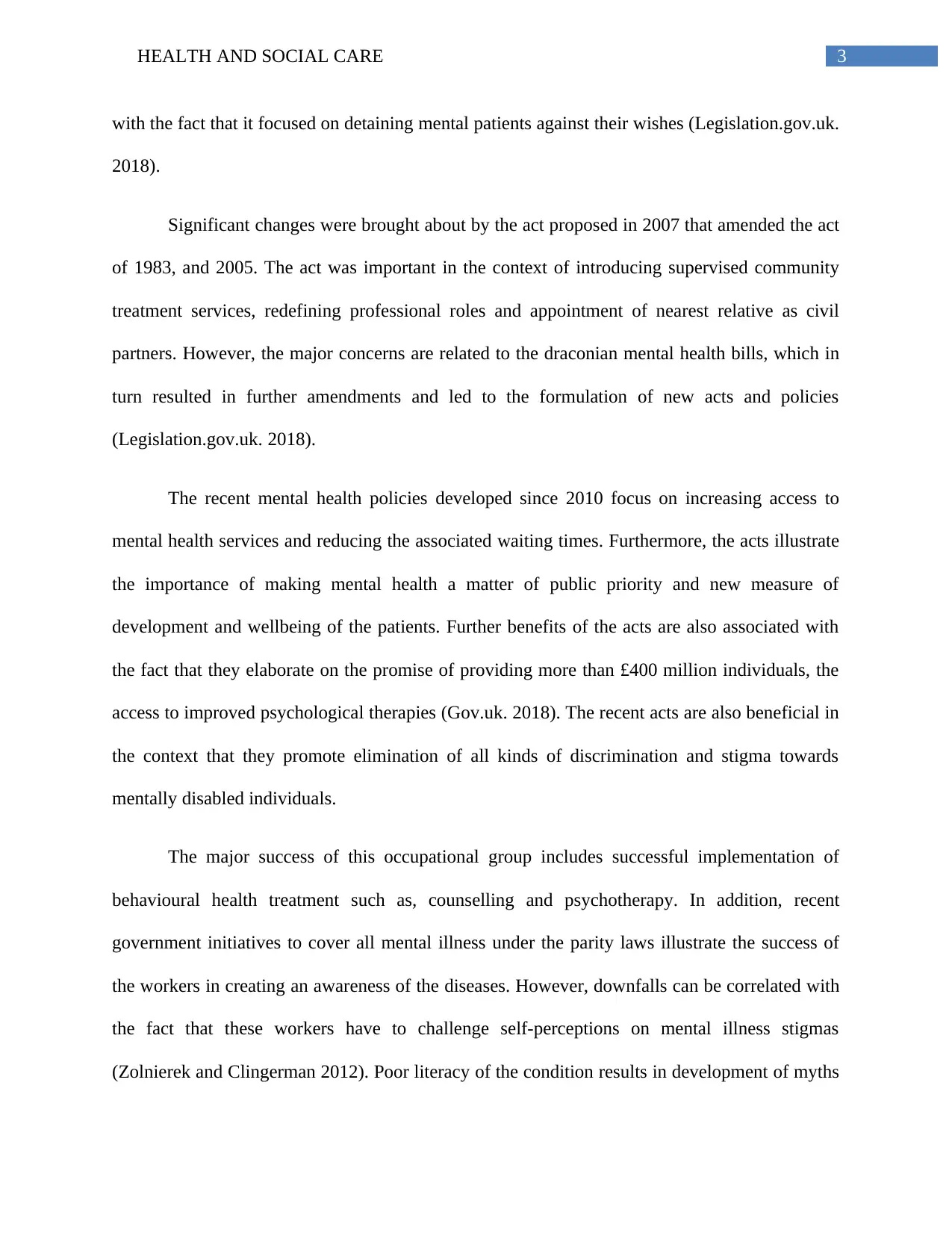
3HEALTH AND SOCIAL CARE
with the fact that it focused on detaining mental patients against their wishes (Legislation.gov.uk.
2018).
Significant changes were brought about by the act proposed in 2007 that amended the act
of 1983, and 2005. The act was important in the context of introducing supervised community
treatment services, redefining professional roles and appointment of nearest relative as civil
partners. However, the major concerns are related to the draconian mental health bills, which in
turn resulted in further amendments and led to the formulation of new acts and policies
(Legislation.gov.uk. 2018).
The recent mental health policies developed since 2010 focus on increasing access to
mental health services and reducing the associated waiting times. Furthermore, the acts illustrate
the importance of making mental health a matter of public priority and new measure of
development and wellbeing of the patients. Further benefits of the acts are also associated with
the fact that they elaborate on the promise of providing more than £400 million individuals, the
access to improved psychological therapies (Gov.uk. 2018). The recent acts are also beneficial in
the context that they promote elimination of all kinds of discrimination and stigma towards
mentally disabled individuals.
The major success of this occupational group includes successful implementation of
behavioural health treatment such as, counselling and psychotherapy. In addition, recent
government initiatives to cover all mental illness under the parity laws illustrate the success of
the workers in creating an awareness of the diseases. However, downfalls can be correlated with
the fact that these workers have to challenge self-perceptions on mental illness stigmas
(Zolnierek and Clingerman 2012). Poor literacy of the condition results in development of myths
with the fact that it focused on detaining mental patients against their wishes (Legislation.gov.uk.
2018).
Significant changes were brought about by the act proposed in 2007 that amended the act
of 1983, and 2005. The act was important in the context of introducing supervised community
treatment services, redefining professional roles and appointment of nearest relative as civil
partners. However, the major concerns are related to the draconian mental health bills, which in
turn resulted in further amendments and led to the formulation of new acts and policies
(Legislation.gov.uk. 2018).
The recent mental health policies developed since 2010 focus on increasing access to
mental health services and reducing the associated waiting times. Furthermore, the acts illustrate
the importance of making mental health a matter of public priority and new measure of
development and wellbeing of the patients. Further benefits of the acts are also associated with
the fact that they elaborate on the promise of providing more than £400 million individuals, the
access to improved psychological therapies (Gov.uk. 2018). The recent acts are also beneficial in
the context that they promote elimination of all kinds of discrimination and stigma towards
mentally disabled individuals.
The major success of this occupational group includes successful implementation of
behavioural health treatment such as, counselling and psychotherapy. In addition, recent
government initiatives to cover all mental illness under the parity laws illustrate the success of
the workers in creating an awareness of the diseases. However, downfalls can be correlated with
the fact that these workers have to challenge self-perceptions on mental illness stigmas
(Zolnierek and Clingerman 2012). Poor literacy of the condition results in development of myths
Paraphrase This Document
Need a fresh take? Get an instant paraphrase of this document with our AI Paraphraser
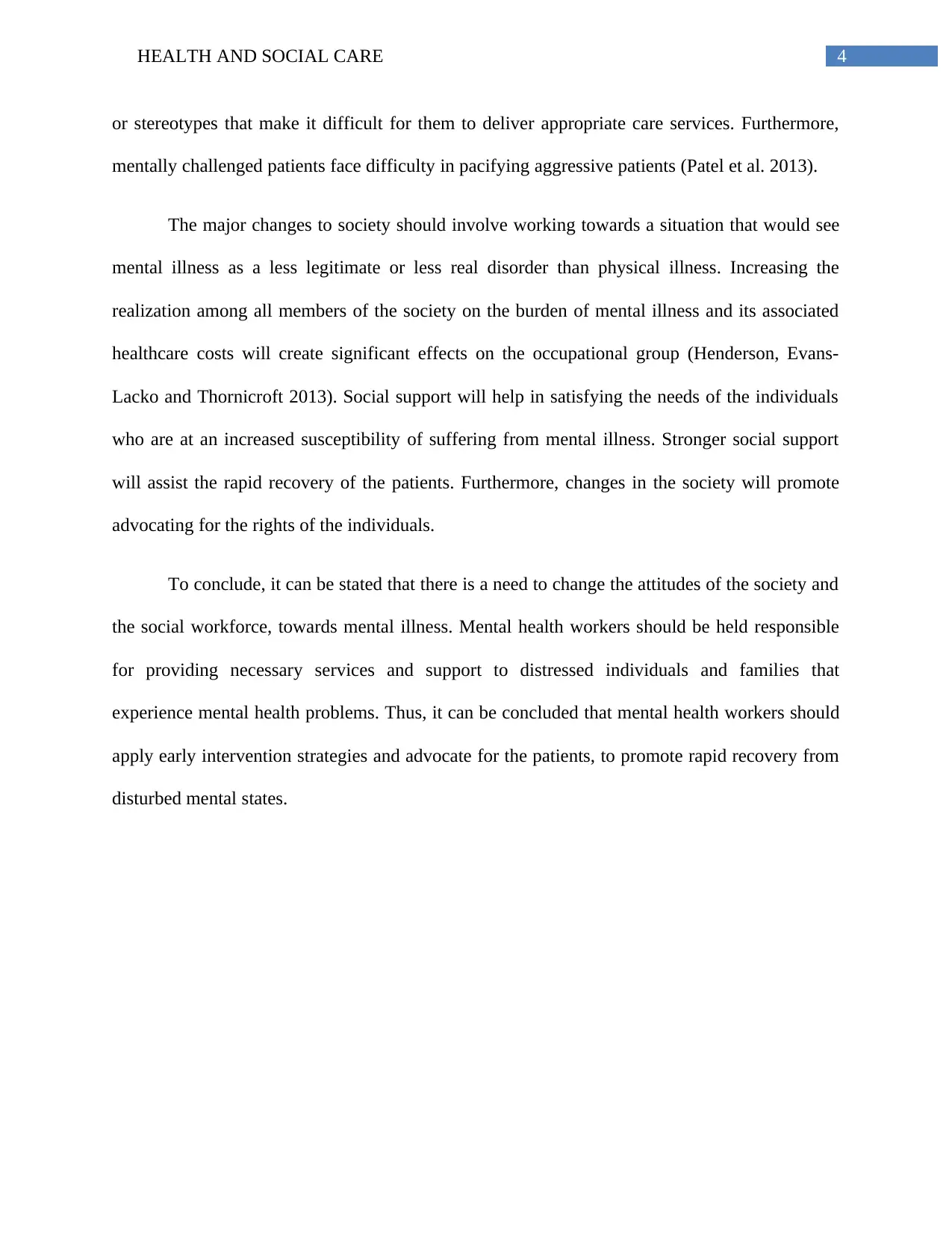
4HEALTH AND SOCIAL CARE
or stereotypes that make it difficult for them to deliver appropriate care services. Furthermore,
mentally challenged patients face difficulty in pacifying aggressive patients (Patel et al. 2013).
The major changes to society should involve working towards a situation that would see
mental illness as a less legitimate or less real disorder than physical illness. Increasing the
realization among all members of the society on the burden of mental illness and its associated
healthcare costs will create significant effects on the occupational group (Henderson, Evans-
Lacko and Thornicroft 2013). Social support will help in satisfying the needs of the individuals
who are at an increased susceptibility of suffering from mental illness. Stronger social support
will assist the rapid recovery of the patients. Furthermore, changes in the society will promote
advocating for the rights of the individuals.
To conclude, it can be stated that there is a need to change the attitudes of the society and
the social workforce, towards mental illness. Mental health workers should be held responsible
for providing necessary services and support to distressed individuals and families that
experience mental health problems. Thus, it can be concluded that mental health workers should
apply early intervention strategies and advocate for the patients, to promote rapid recovery from
disturbed mental states.
or stereotypes that make it difficult for them to deliver appropriate care services. Furthermore,
mentally challenged patients face difficulty in pacifying aggressive patients (Patel et al. 2013).
The major changes to society should involve working towards a situation that would see
mental illness as a less legitimate or less real disorder than physical illness. Increasing the
realization among all members of the society on the burden of mental illness and its associated
healthcare costs will create significant effects on the occupational group (Henderson, Evans-
Lacko and Thornicroft 2013). Social support will help in satisfying the needs of the individuals
who are at an increased susceptibility of suffering from mental illness. Stronger social support
will assist the rapid recovery of the patients. Furthermore, changes in the society will promote
advocating for the rights of the individuals.
To conclude, it can be stated that there is a need to change the attitudes of the society and
the social workforce, towards mental illness. Mental health workers should be held responsible
for providing necessary services and support to distressed individuals and families that
experience mental health problems. Thus, it can be concluded that mental health workers should
apply early intervention strategies and advocate for the patients, to promote rapid recovery from
disturbed mental states.
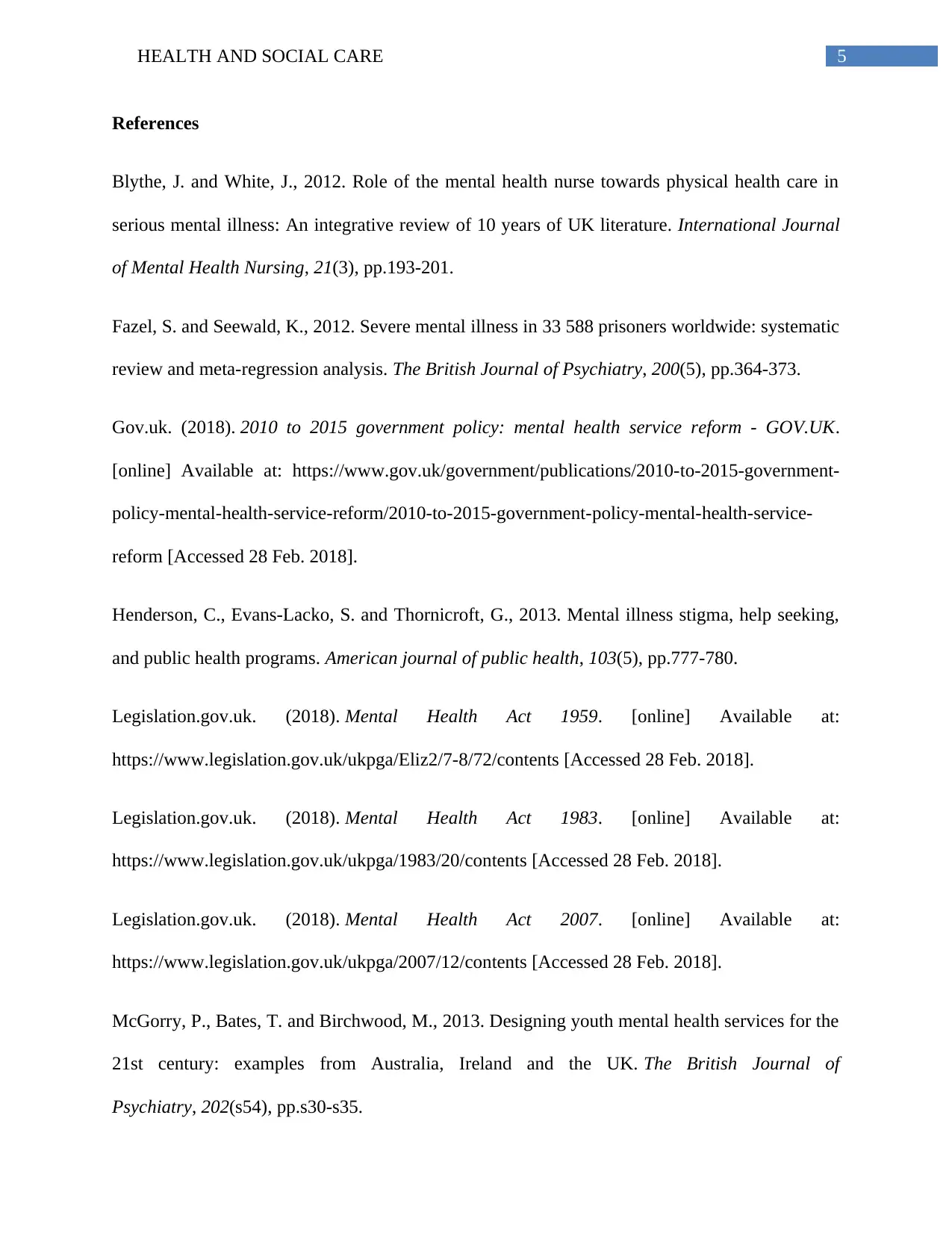
5HEALTH AND SOCIAL CARE
References
Blythe, J. and White, J., 2012. Role of the mental health nurse towards physical health care in
serious mental illness: An integrative review of 10 years of UK literature. International Journal
of Mental Health Nursing, 21(3), pp.193-201.
Fazel, S. and Seewald, K., 2012. Severe mental illness in 33 588 prisoners worldwide: systematic
review and meta-regression analysis. The British Journal of Psychiatry, 200(5), pp.364-373.
Gov.uk. (2018). 2010 to 2015 government policy: mental health service reform - GOV.UK.
[online] Available at: https://www.gov.uk/government/publications/2010-to-2015-government-
policy-mental-health-service-reform/2010-to-2015-government-policy-mental-health-service-
reform [Accessed 28 Feb. 2018].
Henderson, C., Evans-Lacko, S. and Thornicroft, G., 2013. Mental illness stigma, help seeking,
and public health programs. American journal of public health, 103(5), pp.777-780.
Legislation.gov.uk. (2018). Mental Health Act 1959. [online] Available at:
https://www.legislation.gov.uk/ukpga/Eliz2/7-8/72/contents [Accessed 28 Feb. 2018].
Legislation.gov.uk. (2018). Mental Health Act 1983. [online] Available at:
https://www.legislation.gov.uk/ukpga/1983/20/contents [Accessed 28 Feb. 2018].
Legislation.gov.uk. (2018). Mental Health Act 2007. [online] Available at:
https://www.legislation.gov.uk/ukpga/2007/12/contents [Accessed 28 Feb. 2018].
McGorry, P., Bates, T. and Birchwood, M., 2013. Designing youth mental health services for the
21st century: examples from Australia, Ireland and the UK. The British Journal of
Psychiatry, 202(s54), pp.s30-s35.
References
Blythe, J. and White, J., 2012. Role of the mental health nurse towards physical health care in
serious mental illness: An integrative review of 10 years of UK literature. International Journal
of Mental Health Nursing, 21(3), pp.193-201.
Fazel, S. and Seewald, K., 2012. Severe mental illness in 33 588 prisoners worldwide: systematic
review and meta-regression analysis. The British Journal of Psychiatry, 200(5), pp.364-373.
Gov.uk. (2018). 2010 to 2015 government policy: mental health service reform - GOV.UK.
[online] Available at: https://www.gov.uk/government/publications/2010-to-2015-government-
policy-mental-health-service-reform/2010-to-2015-government-policy-mental-health-service-
reform [Accessed 28 Feb. 2018].
Henderson, C., Evans-Lacko, S. and Thornicroft, G., 2013. Mental illness stigma, help seeking,
and public health programs. American journal of public health, 103(5), pp.777-780.
Legislation.gov.uk. (2018). Mental Health Act 1959. [online] Available at:
https://www.legislation.gov.uk/ukpga/Eliz2/7-8/72/contents [Accessed 28 Feb. 2018].
Legislation.gov.uk. (2018). Mental Health Act 1983. [online] Available at:
https://www.legislation.gov.uk/ukpga/1983/20/contents [Accessed 28 Feb. 2018].
Legislation.gov.uk. (2018). Mental Health Act 2007. [online] Available at:
https://www.legislation.gov.uk/ukpga/2007/12/contents [Accessed 28 Feb. 2018].
McGorry, P., Bates, T. and Birchwood, M., 2013. Designing youth mental health services for the
21st century: examples from Australia, Ireland and the UK. The British Journal of
Psychiatry, 202(s54), pp.s30-s35.
⊘ This is a preview!⊘
Do you want full access?
Subscribe today to unlock all pages.

Trusted by 1+ million students worldwide
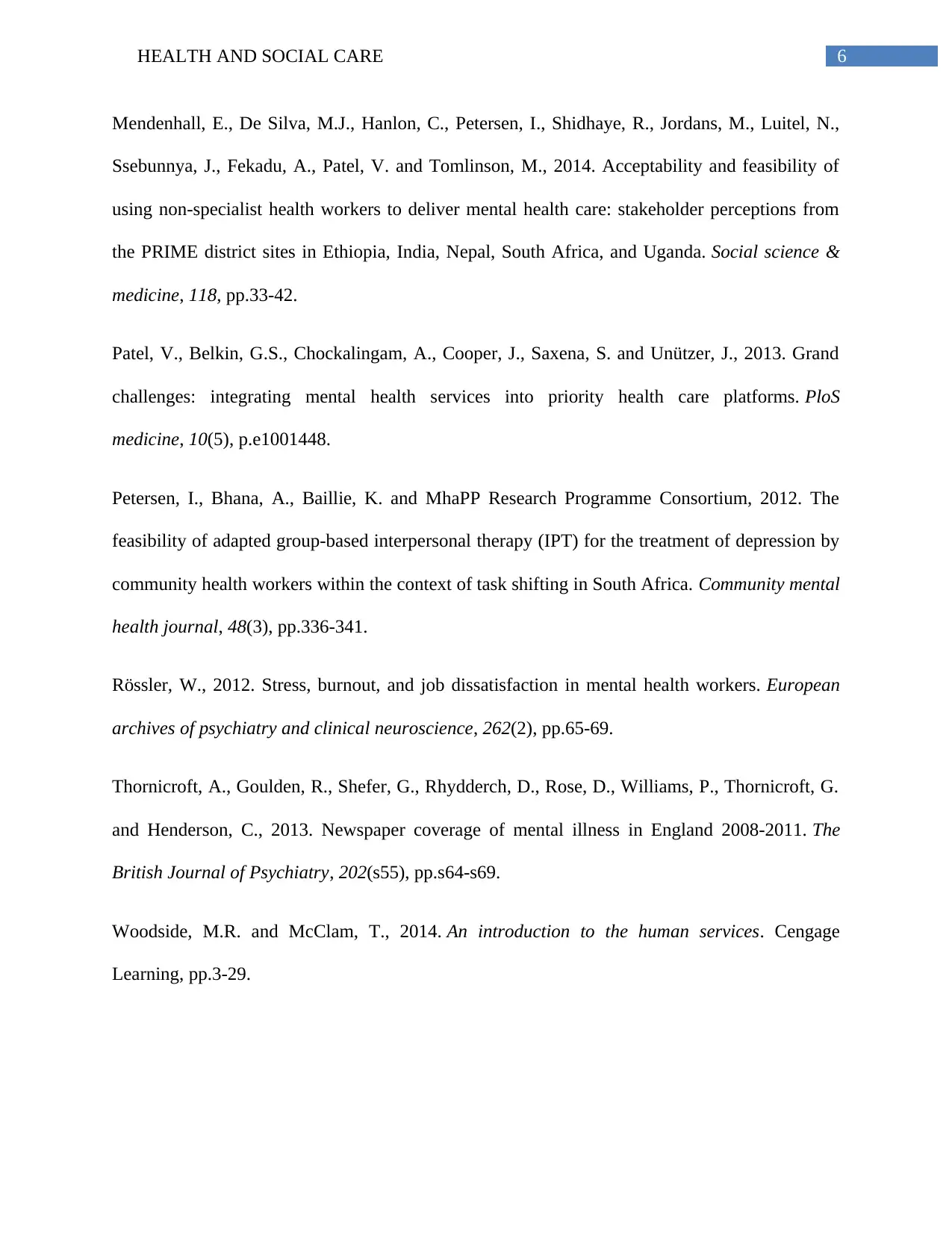
6HEALTH AND SOCIAL CARE
Mendenhall, E., De Silva, M.J., Hanlon, C., Petersen, I., Shidhaye, R., Jordans, M., Luitel, N.,
Ssebunnya, J., Fekadu, A., Patel, V. and Tomlinson, M., 2014. Acceptability and feasibility of
using non-specialist health workers to deliver mental health care: stakeholder perceptions from
the PRIME district sites in Ethiopia, India, Nepal, South Africa, and Uganda. Social science &
medicine, 118, pp.33-42.
Patel, V., Belkin, G.S., Chockalingam, A., Cooper, J., Saxena, S. and Unützer, J., 2013. Grand
challenges: integrating mental health services into priority health care platforms. PloS
medicine, 10(5), p.e1001448.
Petersen, I., Bhana, A., Baillie, K. and MhaPP Research Programme Consortium, 2012. The
feasibility of adapted group-based interpersonal therapy (IPT) for the treatment of depression by
community health workers within the context of task shifting in South Africa. Community mental
health journal, 48(3), pp.336-341.
Rössler, W., 2012. Stress, burnout, and job dissatisfaction in mental health workers. European
archives of psychiatry and clinical neuroscience, 262(2), pp.65-69.
Thornicroft, A., Goulden, R., Shefer, G., Rhydderch, D., Rose, D., Williams, P., Thornicroft, G.
and Henderson, C., 2013. Newspaper coverage of mental illness in England 2008-2011. The
British Journal of Psychiatry, 202(s55), pp.s64-s69.
Woodside, M.R. and McClam, T., 2014. An introduction to the human services. Cengage
Learning, pp.3-29.
Mendenhall, E., De Silva, M.J., Hanlon, C., Petersen, I., Shidhaye, R., Jordans, M., Luitel, N.,
Ssebunnya, J., Fekadu, A., Patel, V. and Tomlinson, M., 2014. Acceptability and feasibility of
using non-specialist health workers to deliver mental health care: stakeholder perceptions from
the PRIME district sites in Ethiopia, India, Nepal, South Africa, and Uganda. Social science &
medicine, 118, pp.33-42.
Patel, V., Belkin, G.S., Chockalingam, A., Cooper, J., Saxena, S. and Unützer, J., 2013. Grand
challenges: integrating mental health services into priority health care platforms. PloS
medicine, 10(5), p.e1001448.
Petersen, I., Bhana, A., Baillie, K. and MhaPP Research Programme Consortium, 2012. The
feasibility of adapted group-based interpersonal therapy (IPT) for the treatment of depression by
community health workers within the context of task shifting in South Africa. Community mental
health journal, 48(3), pp.336-341.
Rössler, W., 2012. Stress, burnout, and job dissatisfaction in mental health workers. European
archives of psychiatry and clinical neuroscience, 262(2), pp.65-69.
Thornicroft, A., Goulden, R., Shefer, G., Rhydderch, D., Rose, D., Williams, P., Thornicroft, G.
and Henderson, C., 2013. Newspaper coverage of mental illness in England 2008-2011. The
British Journal of Psychiatry, 202(s55), pp.s64-s69.
Woodside, M.R. and McClam, T., 2014. An introduction to the human services. Cengage
Learning, pp.3-29.
Paraphrase This Document
Need a fresh take? Get an instant paraphrase of this document with our AI Paraphraser

7HEALTH AND SOCIAL CARE
Zolnierek, C.D. and Clingerman, E.M., 2012. A medical–surgical nurse’s perceptions of caring
for a person with severe mental illness. Journal of the American Psychiatric Nurses
Association, 18(4), pp.226-235.
Zolnierek, C.D. and Clingerman, E.M., 2012. A medical–surgical nurse’s perceptions of caring
for a person with severe mental illness. Journal of the American Psychiatric Nurses
Association, 18(4), pp.226-235.
1 out of 8
Related Documents
Your All-in-One AI-Powered Toolkit for Academic Success.
+13062052269
info@desklib.com
Available 24*7 on WhatsApp / Email
![[object Object]](/_next/static/media/star-bottom.7253800d.svg)
Unlock your academic potential
Copyright © 2020–2026 A2Z Services. All Rights Reserved. Developed and managed by ZUCOL.





